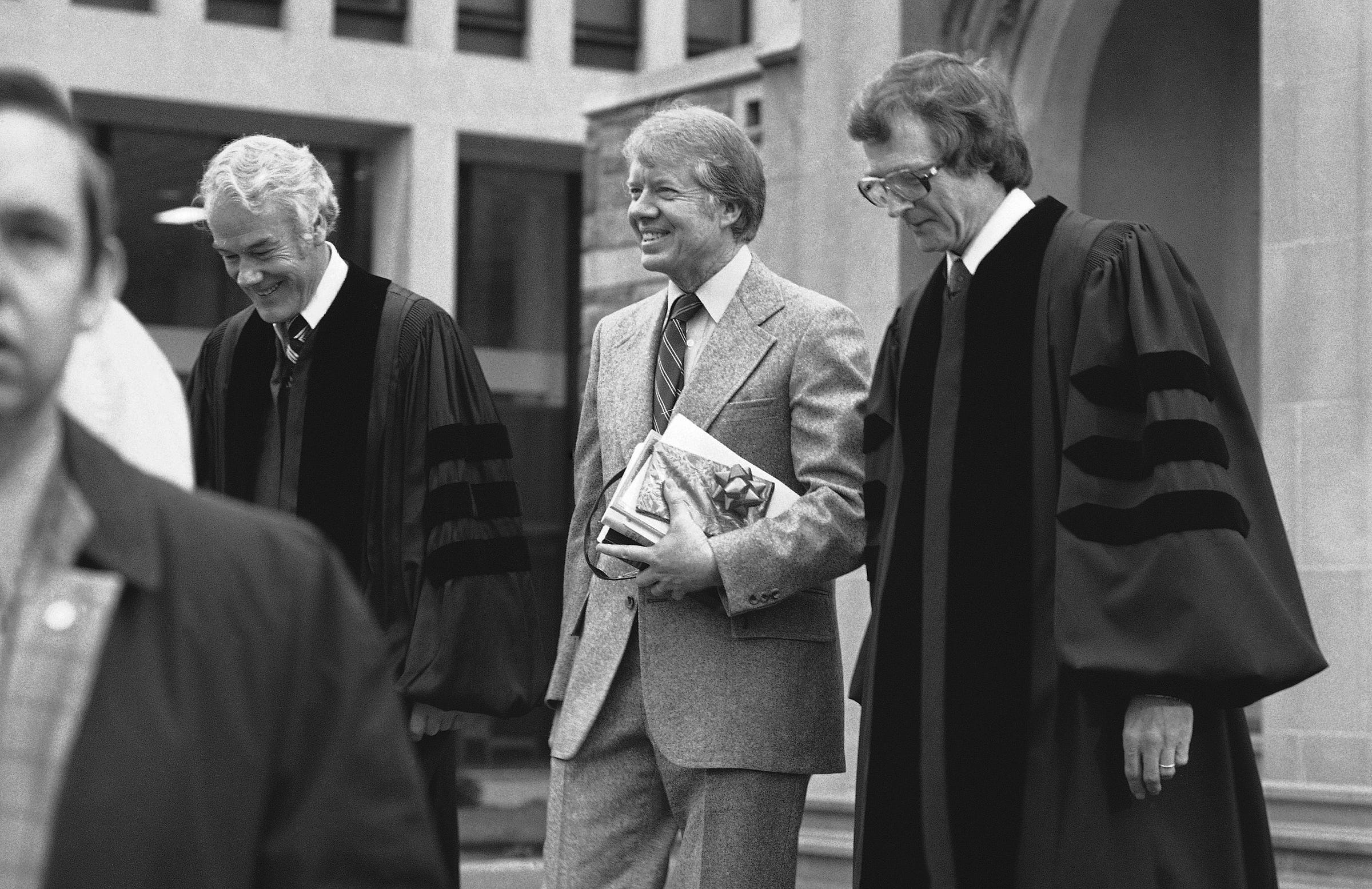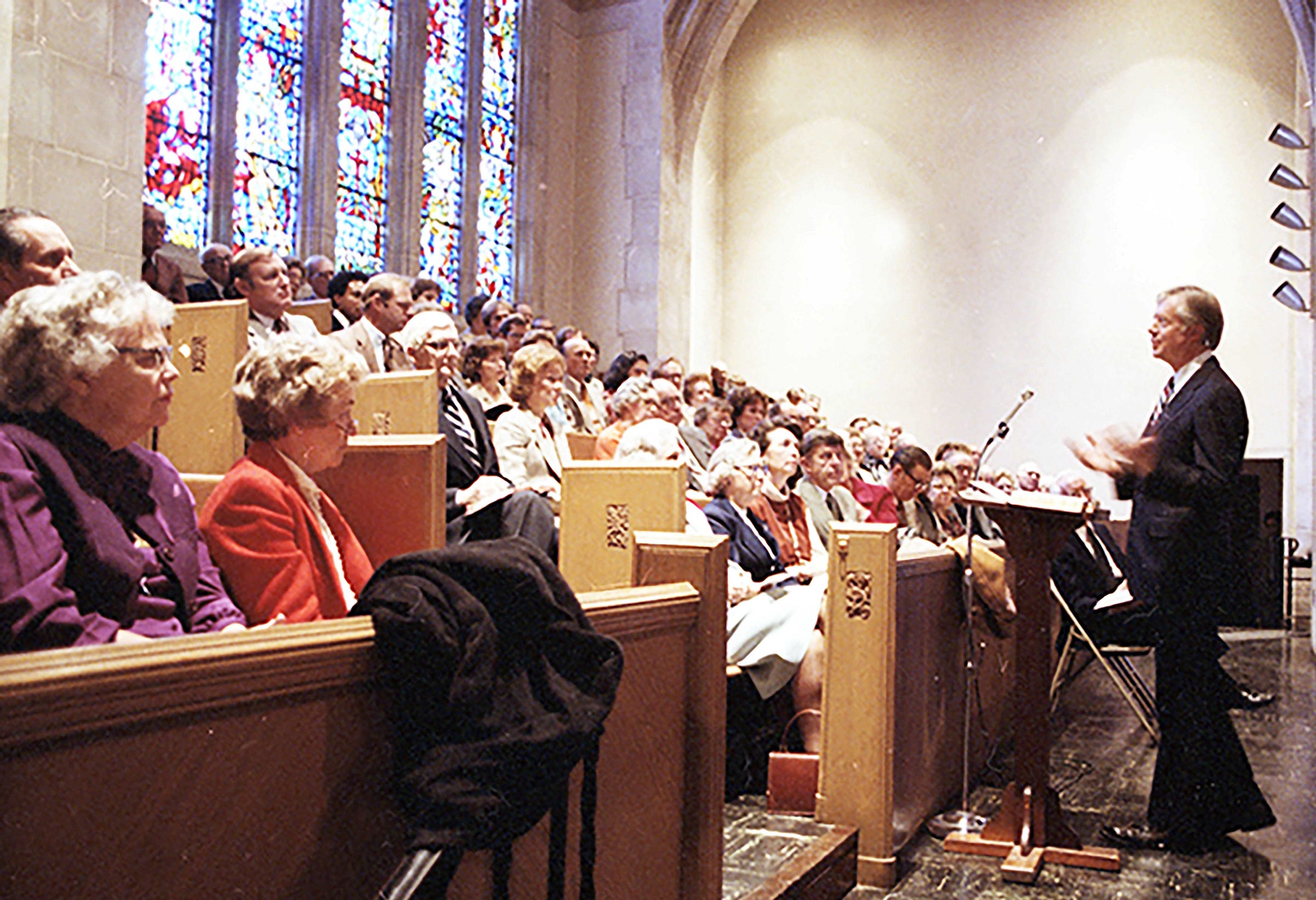‘Where Were Those Thousands of Christians?’
Below is a guest piece from Christi Harlan. A 32-year member of the First Baptist Church of the City of Washington, D.C., she is the author of Mr. President, The Class Is Yours, containing the first-ever transcripts of the Sunday School lessons taught by President Jimmy Carter. She also published the backstories of the lessons and the church in Normal Lives: President Jimmy Carter and His Church. Learn more about her books at ChristiHarlanWriter.com and in her 2024 Dangerous Dogma interview.
The Sunday School curriculum prescribed a lesson from Acts 21-23 and the title, “The Cost of Concern,” focused on the fallout from Paul’s disruptive visit to Jerusalem. The teacher pivoted to a more contemporary concern.
“We live in a time of challenge and of trial: trial of ourselves, of our standards, of morality, our commitment to the elements of life taught by and exemplified by Christ. The Christian church is divided, searching for an alleviation of division,” the teacher said. “Our nation is examining its own soul, the characteristics that describe an American, our relationship with other countries, the cohesion that should bind us together in a spirit of Christian fellowship.”
The teacher was President Jimmy Carter, and his concerns — eerily fitting for 2025 — were part of the Sunday School lesson he taught on Sept. 9, 1979, at the First Baptist Church of the City of Washington, D.C.

The lesson was one of at least 17 that Carter led for the Couples Class at First Baptist during his 48 months as president and active member of First Baptist. Fourteen of his lessons were recorded, revealing a skilled Bible scholar and solicitous teacher who rarely mentioned the demands of his office.
Those demands mounted throughout 1979 as the president dealt with the partial meltdown of the Three Mile Island nuclear reactor in Pennsylvania, the signing of the SALT II nuclear treaty with the Soviet Union, and the installation of new leaders in several countries (including Saddam Hussein as president of Iraq and the Ayatollah Khomeini as supreme leader of Iran).
Carter mentioned none of those events as he addressed the members of the Couples Class in the balcony of First Baptist that September, nor did he mention the recent surge in political activity by fundamentalists, from the formation of the Moral Majority by Jerry Falwell Sr. to the beginning of the “conservative resurgence” in the Southern Baptist Convention at its 1979 annual meeting in Houston.
As usual, the president was focused on the Sunday school lesson: “We’re going to study today from Acts, the 21st, 22nd, 23rd chapters, about one of the most important experiences in Paul’s life and perhaps in the life of Christianity,” he said. “It’s a lesson that illustrates some important points, not only for that day and age, but also for our own lives and for the modern church.”
Over the next 40 minutes, Carter stuck largely to the assigned text, starting with Paul’s cordial reception by James (the leader of the Jerusalem church and its thousands of members), Paul’s visit to the temple, and his inflammatory embrace of gentiles. Things went sharply downhill from there, with Paul in chains while facing death threats from Jewish extremists and eventually hustled to Caesarea by the Romans for the sake of peace in Jerusalem.

Carter concluded the lesson with a harsh assessment of the Christian church in Jerusalem. In retrospect, his comments could be read as raising alarms about the conservative Christian movement that would campaign against his re-election and eventually drive him from the Southern Baptist Convention.
Forty-six years later, his comments can also be read as a contemporary caution against silence and inaction in response to the rise of Christian Nationalism and an administration deliberately dismantling the wall separating church and state. This is what President Jimmy Carter said as he closed his Sunday school lesson in September 1979:
One question came to me as I studied this lesson. Where was James?
Yeah, where was James? Where were those thousands of Christians? You don’t hear one word about the Christians in Jerusalem in these three chapters of Acts when one of the top Christian leaders was under physical attack. You don’t hear that James came to the colonel and said, “Please release this man. He’s okay.”
And you don’t see 500 Christians coming forward to stand in front of the Roman barracks and saying, “Let us walk with you to Caesarea to make sure nothing happens to our brother Paul.” As a matter of fact, never again in the New Testament is a Jerusalem Christian church mentioned, and I’m not sure it survived.
There’s no record of the Jerusalem Christians ever going outside the city limits of Jerusalem to witness for Christ or even to witness within their own city. It’s as though the Christian church in Jerusalem itself died with this incident, because of timidity or cowardice, I’m not sure.
Nobody can prove it, but we ought to think about it. Did that mean that the Christian church was dead? No, because Paul lived and other Christians lived who carried out Christ’s mandate to witness with words and with acts. …
It was not the end of Paul and, because it was not the end of Paul and others like him, it was not the end of the Christian church. The church has been tested time and time again because of divisions within it and because of timidity of those who profess a faith in Christ.
And what applied to Paul in this time applies to us, and what applied to the church in Jerusalem at that time could very well apply to the church in which we worship if we forget the mandate of Christ, if we rest on our laurels, if we are so proud of our status in religious circles and in social circles that we forget the fervor and the courage and the ability and the commitment and the dedication, which is inherently within us. …
Who came out worse? Paul paid a severe price because he witnessed for Christ. It was not the end of him. The Christian church in Jerusalem didn’t pay a price because they stayed quiet, and they stayed secure, and we never heard from them again.
That is a deep lesson here, and I hope we will remember it.
As a public witness,
Christi Harlan
NOTE: This lesson is among the 14 by President Carter included in Mr. President, The Class Is Yours: Jimmy Carter’s Sunday School Lessons in Washington, D.C.



Thanks so very, very much for this wonderful and so timely an article. I worked in both of President Carter's campaigns. I had the privilege when he was a candidate to spend a brief time with him at a political even in Columbia Missouri. The more intellectual presidential historians understand that he will never be placed among our presidential greats for his one term in office, however, they also understand that he embodied the very best of what the person who holds that office should be, how they should act, and the example they should set. His service to the world, not just this nation, after his presidency, was not equalled by any of his predecessors, nor his successors. I serous doubt the standard his Post-Presidency established will be attained in the years to come. We need, we must be reminded in this time of corruption, chaos, and utter incompetency in our government and society there are those who exemplify "our better angels" - Jimmy Carter was one such person. May his tribe increase!!
I understand President Carter's questions about the church at Jerusalem. As I have read the Book of Acts, my impression is that the church at Antioch really understood the potential for the Christian movement. They continually put feet to their beliefs, following the Spirit through new doors of opportunity. They engaged the world as it was rather than what they wished it to be. They continue to be a positive witness for us.